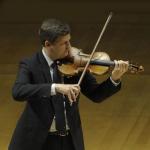
On 27 June the Mariinsky Theatre hosted a performance by the violinist James Ehnes, a jury member of the Tchaikovsky Competition. Here is a brief interview with the musician before his recital.
– You play one of the finest Stradivarius instruments – it was crafted in 1715. Was it hard to get it?
– Yes! It was a long-long process. I first saw the instrument almost twenty years ago, in November 1996, and by September 1999 I have figured out a way of... well, basically I convinced someone to buy the instrument and let me use it. And then just, I guess, maybe four years ago I worked out a deal where I bought the violin from my patron. Now no one can take it from me! But these things are always difficult. They are hard to find, they are expensive, but ultimately they are very rewarding and incredibly inspiring.
– You’ve released the disc Homage, on which you perform baroque and romantic music – Bazzini, Ravel, de Falla, Vaughan Williams and Elgar – on nine different “named” violins and three violas. What have these instruments taught you? How did you decide which violin best suited the music of each composer?
– Well, luckily when I made this recording I already had known the instruments somewhat so I had an idea of their particular qualities so I came up with a list of pieces that I thought would be suitable for the disc in terms of timing and in terms of style and then basically I had a worksheet of about thirty pieces and twelve instruments and I tried to match them as best I could in the ways that show both the music and the instrument to the best advantage. But certainly each one of those instruments, as any great instrument, can teach you something. May be there is a sound that you hear when you are playing it, then it sticks with you and you’re trying to find this sound on your own violin, in a way that even if you stop playing the instrument it remains in your imagination.
– Bach’s sonatas and partitas for violin are a kind of violinist’s “Bible”. How often do you include them in your recitals and what does that music mean to you?
– Well, I think you summed it up very well – this is in way something very sacred to violinists, its music that every violist grows up studying, certainly for me pieces that I’ve studied and lived with for my entire performing life. But there are pieces that I play often that I enjoy playing often and I think that it can be a really wonderful experience particularly when one has the opportunity to play in a very beautiful space, and today, playing at the Mariinsky Concert Hall, it’s the perfect venue for this music, and I think when you have this glorious music you are very lucky to play on this instrument and the instrument of the hall is something that is so inspiring.
– Performing Bach these days is complicated without looking at the experience of historic performances. Where do you see your own place in the discussion between those who prefer the authentic and those who prefer the romantic?
– Well, I think that when any performer gets into trouble it is when they try to over intellectualize and justify the interpretive decisions they make. I think it is a funny thing that anyone could claim an idea of authentic performance because there are so many questions that will always be unanswered about how this music was originally performed and how it was intended to be performed. Certainly some of the historical studies that had been done in the recent generations and performances done by historically informed performers had done a great deal for people’s understanding of how this music can speak. But as far as where my own performances I think I have to leave it up to the listener. There are some listeners that would think it one way and others would think it another, and for myself I play it this way because I think that’s how it has to go.
– Do you write your own cadenzas for concerti? Or do you perform those composed by others?
– It depends on the piece, depends very much on the piece. I think that in the case when there is a cadenza written by the composer I go with that. In the case when there is not, such as Mozart or Beethoven, it depends on whether I think I have anything better than I can say. For Mozart concerti I have written my own cadenzas and I continue to tinker with them and come up with different things and so I do my own in Mozart and Haydn. For Beethoven, the cadenzas that I play are cadenzas by Fritz Kreisler, they are so fantastic that I wish every day I came up with ideas that good but I don’t feel that I have.
– You are now a member of the violin jury of the Tchaikovsky Competition. When you were younger did you not want to take part in the competition itself?
– I think that the Tchaikovsky perhaps more than any other competition out there provides opportunities that are very difficult to come by through other means. I fortunately was able to get some of those opportunities without having to do the competition, but certainly yes, I remember as a little boy hearing about the Tchaikovsky Competition, seeing things on TV and thinking how exciting would be not just to take part but just to be around it. And that has been absolutely true that the atmosphere of the last days of the semi-finals, the atmosphere at the Moscow Conservatory was electric, it was so exciting just to be there. I was nervous even though I was not even playing, so it’s an incredible thing!